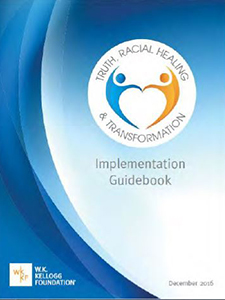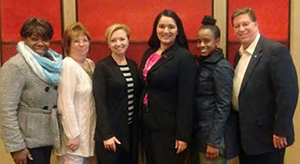 Welcoming communities are a key component of great placemaking. Studies have shown that communities that welcome, foster trust, and proactively integrate everyone into the fabric of everyday life are at a distinct advantage over those that do not. In this session, Oronde Miller and Howard Walters from the W.K. Kellogg Foundation shared details on Truth, Racial Healing & Transformation (TRHT), the program the Foundation developed to help communities have important, but perhaps difficult, conversations on this topic.Stacy Stout, assistant to the city manager in Grand Rapids, elaborated on the city’s inclusivity initiatives. .
Welcoming communities are a key component of great placemaking. Studies have shown that communities that welcome, foster trust, and proactively integrate everyone into the fabric of everyday life are at a distinct advantage over those that do not. In this session, Oronde Miller and Howard Walters from the W.K. Kellogg Foundation shared details on Truth, Racial Healing & Transformation (TRHT), the program the Foundation developed to help communities have important, but perhaps difficult, conversations on this topic.Stacy Stout, assistant to the city manager in Grand Rapids, elaborated on the city’s inclusivity initiatives. .
Truth, Racial Healing & Transformation
THRT is a comprehensive, national and community-based process to plan for and bring about transformational and sustainable change, and to address the historic and contemporary effects of racism. Kellogg makes the point that advancing racial equity is both a social justice goal and a driver of business and economic growth. Greater racial equity can alleviate workforce constraints, increase consumer spending, strengthen community, and reduce the fiscal pressures of an aging population.
The path forward involves many elements of society, including housing, education, health, criminal justice, and employment/entrepreneurship. Communities need to address a variety of questions:
- Current disparities – Where are we now?
- Historical context – How did we get here?
- Economic and social impacts – What is the cost?
- Evidence-based strategies – What can we do?
There are many high-leverage strategies that will get your community moving in the right direction. Consider investing early – prenatal and early childhood; supporting movement to higher opportunity neighborhoods; increasing integration through zoning; revitalizing existing neighborhoods, and aligning resources with need. Kellogg offers many other high leverage strategies.
Need some examples? Take a look at these successful programs in Michigan:
- Cascade Engineering: a Partners for a Racism Free Community “Credentialed Partner,” Welfare to Career, returning citizens (Grand Rapids)
- New P-20 Partnership cradle-to-career in NW Detroit (colleges, public schools, philanthropy)
- The Source: nonprofit network of employers sharing costs of employee support services (Grand Rapids)
- Entrepreneurs of Color Fund: expanding access to capital ($18M) and business assistance (WKKF, JPMorgan Chase, Detroit Development Corp., Fifth Third Bank, Kresge, Wilson Foundation)
It’s important to keep in mind that we all have the power to advance racial equity. As individuals, communities, businesses, governments, philanthropies, we can:
- Influence attitudes and actions around us
- Evaluate workplace recruiting, hiring, environment, advancement, pay, and team composition; assess products and markets
- Invest in community workforce and economic development
- Support public policies that advance equity
- Join the national discourse on equity and our economic future
Grand Rapids: Effective & Inclusive Government
 Grand Rapids acknowledges that governments had a key role in creating systems and policies that contributed to inequities, so they have a responsibility and opportunity to address them.
Grand Rapids acknowledges that governments had a key role in creating systems and policies that contributed to inequities, so they have a responsibility and opportunity to address them.
In 2016, Grand Rapids joined Racial Equity Here, a national movement to advance racial equity by dismantling structural racism city by city. Racial Equity Here has helped the city develop a framework for reaching their goals.
- Normalize – develop a shared analysis and definition of the issue and an urgency to address it. Grand Rapids’ actions in this area include examining the city’s racial history; developing racial equity visions, mission, and values to guide their work; and participating in a variety of racial equity training programs.
- Organize – develop an internal infrastructure and partnerships. Grand Rapids’ actions include training and outreach with 35+ civilian boards and committees; forming a Racial Equity Core Team; and holding neighborhood summits.
- Operationalize – create racial equity tools and data to development strategies and drive results. Grand Rapids’ actions include a Racial Equity Plan that affects city services, budget, inclusive engagement, racial equity in employment and procurement, neighborhoods, and youth; and embedding that plan into the Transformation and Sustainability Plan.
- Visualize – keep the plan active
Grand Rapids offers this advice: Remember that it’s a journey. Create on-ramps, avoid equity elitism, and acknowledge that everyone can contribute toward equity if they so choose.
For more details, view the complete Convention presentations.
- Oronde Miller, Program Officer, W.K. Kellogg Foundation
- Stacy Stout, Assistant to the City Manager, Grand Rapids
- Howard Walters, Program and Evaluation Officer, W.K. Kellogg Foundation
